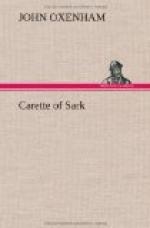For a time they were very intimate, he and Martel. Then Martel made up to Rachel Carre, and their friendship turned to hatred, the more venomous for what had gone before.
But even George Hamon admits that Paul Martel was an unusually good-looking fellow, with very attractive manners when he chose, and a knowledge of the world and its ways, and of men and women, beyond the ordinary, and he won Rachel Carre’s heart against her head and in the teeth of her father’s opposition.
Perhaps if her mother had been alive things might have been different. But she died when Rachel was eight years old, and her father was much away at the fishing, for the farm was poorer then than it became afterwards, and Martel found his opportunities and turned them to account.
I do not pretend to understand fully how it came about—beyond the fact that the little god of love goes about his work blindfold, and that women do the most unaccountable things at times. Even in the most momentous matters they are capable of the most grievous mistakes, though, on the other hand, that same heart instinct also leads them at times to wisdom beyond the gauging of man’s intelligence. A man reasons and keeps tight hand on his feelings; a woman feels and knows; and sometimes a leap in the dark lands one safely, and sometimes not.
To make a long story short, however, Paul Martel and Rachel Carre were married, to the great surprise of all Rachel’s friends and to the great grief of her father.
Martel built a little cottage at the head of the chasm which drops into Havre Gosselin, and her father, Philip Carre, lived lonely on his little farm of Belfontaine, by Port a la Jument, with no companion but his dumb man Krok.
Rachel seemed quite happy in her marriage. There had been many predictions among the gossips as to its outcome, and sharp eyes were not lacking to detect the first signs of the fulfilment of prophecy, nor reasons for visits to the cottage at La Fregondee with a view to discovering them. And perhaps Rachel understood all that perfectly well. She was her father’s daughter, and Philip Carre was one of the most intelligent and deep-thinking men I have ever met.
Her nearest neighbour and chief friend was Jeanne Falla of Beaumanoir, widow of Peter Le Marchant, whose brother John lived on Brecqhou and made a certain reputation there both for himself and the island. She was old enough to have been Rachel’s mother, and Rachel may have confided in her. If she did so her confidence was never abused, for Jeanne Falla could talk more and tell less than any woman I ever knew, and that I count a very great accomplishment.
She was a Guernsey woman by birth, but had lived on Sercq for over twenty years. Her husband was drowned while vraicking a year after they were married, and she had taken the farm in hand and made more of it than ever he would have done if he had lived to be a hundred, for the Le Marchants always tended more to the sea than to the land, though Jeanne Falla’s Peter, I have been told, was more shore-going than the rest. She had no child of her own, and that was the only lack in her life. She made up for it by keeping an open heart to all other children, whereby many gained through her loss, and her loss turned to gain even for herself.




